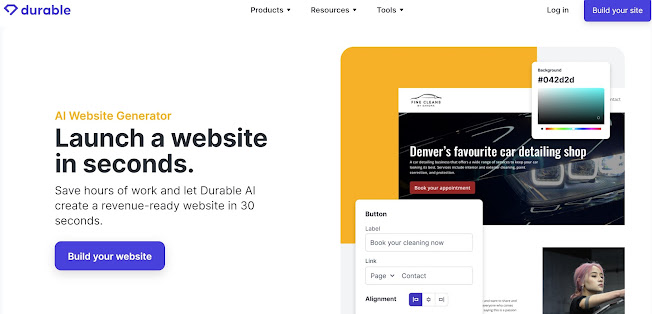''How to Start a Fully Automated Business Through AI''
1-Identify Repetitive Tasks
The first step in automating your business is to identify repetitive tasks that can be automated. This may include tasks such as data entry, customer service, and marketing. Once you have identified the tasks that can be automated, you can move on to the next step.
The first step in automating your business is to identify repetitive tasks that can be automated. This may include tasks such as data entry, customer service, and marketing. Once you have identified the tasks that can be automated, you can move on to the next step.
2-Choose the Right AI Tool
There are many AI tools available in the market, each with its own strengths and weaknesses. When choosing an AI tool, it is important to consider the specific needs of your business. Some popular AI tools for business include chatbots for customer service, email marketing automation tools, and data analytics tools.
There are many AI tools available in the market, each with its own strengths and weaknesses. When choosing an AI tool, it is important to consider the specific needs of your business. Some popular AI tools for business include chatbots for customer service, email marketing automation tools, and data analytics tools.
3-Train Your AI Tool
Once you have chosen an AI tool, you need to train it to perform the tasks you have identified. This may involve providing the tool with data to learn from or setting up rules for it to follow. The more data you provide your AI tool, the better it will become at performing its tasks.
Once you have chosen an AI tool, you need to train it to perform the tasks you have identified. This may involve providing the tool with data to learn from or setting up rules for it to follow. The more data you provide your AI tool, the better it will become at performing its tasks.
4-Integrate Your AI Tool
After you have trained your AI tool, you need to integrate it into your business. This may involve connecting it to your website, social media accounts, or other business tools. Make sure to test your AI tool thoroughly before integrating it into your business to ensure that it works as intended.
After you have trained your AI tool, you need to integrate it into your business. This may involve connecting it to your website, social media accounts, or other business tools. Make sure to test your AI tool thoroughly before integrating it into your business to ensure that it works as intended.
5-Monitor Your AI Tool
Once your AI tool is integrated into your business, it is important to monitor its performance. This may involve setting up alerts for any errors or issues that may arise. By monitoring your AI tool, you can ensure that it continues to work effectively and make adjustments as needed.
Once your AI tool is integrated into your business, it is important to monitor its performance. This may involve setting up alerts for any errors or issues that may arise. By monitoring your AI tool, you can ensure that it continues to work effectively and make adjustments as needed.
6-Continuously Improve
As your business grows and changes, your AI tool may need to be updated or modified. It is important to continuously improve your AI tool to ensure that it is still meeting the needs of your business. This may involve providing it with additional data or modifying its rules.
As your business grows and changes, your AI tool may need to be updated or modified. It is important to continuously improve your AI tool to ensure that it is still meeting the needs of your business. This may involve providing it with additional data or modifying its rules.
7-Hire Experts
If you're not familiar with AI, it can be helpful to hire experts to help you with the process. An AI expert can help you identify the best AI tools for your business, train your AI tool, and integrate it into your business. They can also help you monitor its performance and make improvements as needed.
If you're not familiar with AI, it can be helpful to hire experts to help you with the process. An AI expert can help you identify the best AI tools for your business, train your AI tool, and integrate it into your business. They can also help you monitor its performance and make improvements as needed.
8-Consider Legal and Ethical Implications
As with any new technology, there may be legal and ethical implications to consider when implementing AI in your business. For example, if you're using AI to make hiring decisions, you need to make sure you're not violating any anti-discrimination laws. You should also consider the ethical implications of using AI to replace human workers.
As with any new technology, there may be legal and ethical implications to consider when implementing AI in your business. For example, if you're using AI to make hiring decisions, you need to make sure you're not violating any anti-discrimination laws. You should also consider the ethical implications of using AI to replace human workers.
9-Focus on Customer Experience
One of the key benefits of AI in business is its ability to improve the customer experience. When implementing AI in your business, it's important to focus on how it can benefit your customers. For example, you can use AI chatbots to provide 24/7 customer service, or use AI algorithms to personalize product recommendations.
One of the key benefits of AI in business is its ability to improve the customer experience. When implementing AI in your business, it's important to focus on how it can benefit your customers. For example, you can use AI chatbots to provide 24/7 customer service, or use AI algorithms to personalize product recommendations.
10-Start Small and Scale Up
If you're new to AI, it's a good idea to start small and scale up as you gain more experience. You can start by automating a few tasks and gradually expand to other areas of your business. This will give you time to learn how AI works and how to optimize it for your business.
If you're new to AI, it's a good idea to start small and scale up as you gain more experience. You can start by automating a few tasks and gradually expand to other areas of your business. This will give you time to learn how AI works and how to optimize it for your business.
11-Stay Up-to-Date with AI Trends
AI is a rapidly evolving field, and it's important to stay up-to-date with the latest trends and developments. This will help you stay competitive and ensure that you're getting the most out of your AI investments.
In conclusion, starting a fully automated business through AI requires a strategic approach, careful planning, and ongoing monitoring and improvement. By focusing on identifying repetitive tasks, choosing the right AI tools, training and integrating your AI tool, monitoring its performance, and continuously improving, you can build a fully automated business that runs efficiently and effectively. Hiring experts, considering legal and ethical implications, focusing on customer experience, starting small and scaling up, and staying up-to-date with AI trends can help you ensure a successful transition to a fully automated business.
AI is a rapidly evolving field, and it's important to stay up-to-date with the latest trends and developments. This will help you stay competitive and ensure that you're getting the most out of your AI investments.
In conclusion, starting a fully automated business through AI requires a strategic approach, careful planning, and ongoing monitoring and improvement. By focusing on identifying repetitive tasks, choosing the right AI tools, training and integrating your AI tool, monitoring its performance, and continuously improving, you can build a fully automated business that runs efficiently and effectively. Hiring experts, considering legal and ethical implications, focusing on customer experience, starting small and scaling up, and staying up-to-date with AI trends can help you ensure a successful transition to a fully automated business.












Comments
Post a Comment